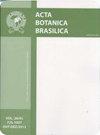山核桃(Brot.)Stokes (Rubiaceae):在森林砍伐和气候变化的压力下,拉丁美洲最后三个濒临灭绝的物种
IF 1.1
4区 生物学
Q4 PLANT SCIENCES
引用次数: 0
摘要
本文章由计算机程序翻译,如有差异,请以英文原文为准。
Carapichea ipecacuanha (Brot.) Stokes (Rubiaceae): The three last Latin American groups at risk of extinction under pressure from deforestation and climate change
Global climate change is currently a serious threat to biodiversity. The understanding of the effects of climate changes on the flora is urgent. Here, we analyze the effects of future climate change on the spatial distribution of the three remaining groups of Carapichea ipecacuanha (Poaia) in the Americas. We built niche-based models for current and optimistic and pessimistic climate scenarios projected for 2050 and 2090. Our findings showed that climatically suitable areas for the Atlantic and Amazon Forest groups will be strongly reduced. The greatest risk of extinction was observed for the Amazon group due to the drastic spatial reduction and abrupt spatial displacement of climate suitability. The climate suitability for the Atlantic Forest group will be reduced, comprising a small suitable area in the transition zone between Minas Gerais and Espirito Santo. The climate suitability for the Panama group remained in an continuous region in Panama and Colombia. Our results encourage future studies that develop conservation management plans in order to ensure the continuation of ecological refugia for this species.
求助全文
通过发布文献求助,成功后即可免费获取论文全文。
去求助
来源期刊

Acta Botanica Brasilica
PLANT SCIENCES-
CiteScore
2.30
自引率
9.10%
发文量
32
审稿时长
6-12 weeks
期刊介绍:
Experimental, theoretical and applied papers on all aspects of plant (including algae) and fungi biology are welcome. The submitted manuscript or its essential content must not have been published previously or be under consideration for publication elsewhere. Contributions should be substantial, written in high-quality English and show general interest. We expect that the submitted manuscript presents a great novelty in Botany, and this should attract a wide audience. Considering this, case studies are only considered if the narrative and implications are provided to be of general interest. Thus, manuscripts that report aspects of local interest are discouraged unless the implications of the findings are wide-reaching. Manuscripts with agronomic subjects are expected to contain a substantial amount of basic plant biology. Please see below some details for specific area.
 求助内容:
求助内容: 应助结果提醒方式:
应助结果提醒方式:


